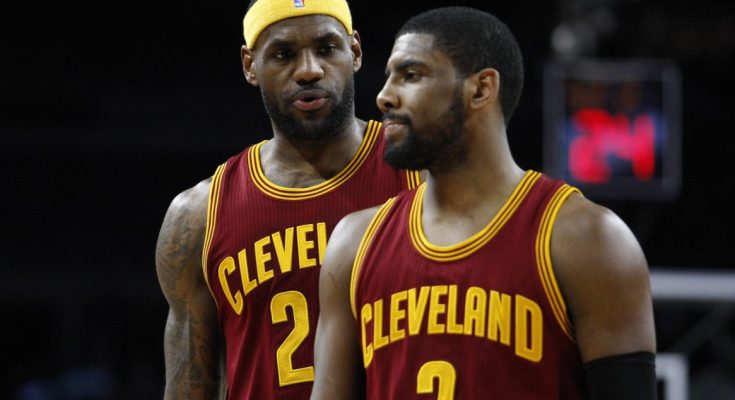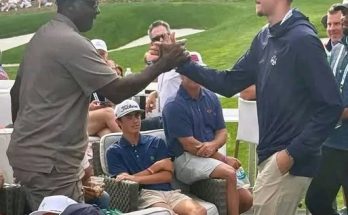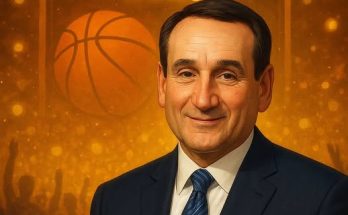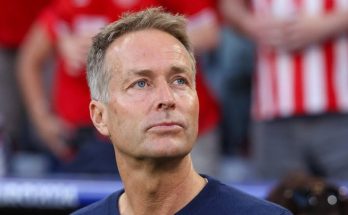Kyrie Irving has always been one of the most enigmatic and fascinating figures in the NBA. His journey—from being the No. 1 overall pick by the Cleveland Cavaliers in 2011 to winning a championship alongside LeBron James in 2016, and then his eventual departure—has been filled with highs, lows, and plenty of introspection. In a recent candid interview, Irving opened up about his time with the Cavaliers, admitting to early bad habits formed from losing and reflecting on his decision to leave LeBron James, calling it simply “my time to move on.”
Irving’s early years in Cleveland were marked by immense individual talent but little team success. Drafted into a franchise still reeling from LeBron James’ departure in 2010, Irving was immediately thrust into the role of savior. The pressure was immense, and the losses piled up. “When I first got to Cleveland, it was tough,” Irving admitted. “I was young, and losing takes a toll on you in ways you don’t always realize at the time. You start developing bad habits—not just on the court, but in how you approach the game mentally. I wasn’t used to losing at any level before that, and suddenly, it felt like it was all I knew.”
Those bad habits, as Irving described them, weren’t just about basketball. They were about mindset, professionalism, and learning how to lead. “I was scoring, I had the highlights, but I wasn’t making my teammates better. I wasn’t fully committed to the defensive end. I thought my job was just to put up numbers, and that’s not how you win in this league.” The Cavaliers struggled to build a competent roster around him, cycling through coaches and failed experiments in free agency. By the time the 2013-14 season ended, Irving had made three All-Star teams but had yet to sniff the playoffs.
Then, LeBron James returned.
The summer of 2014 changed everything for Irving and the Cavaliers. LeBron’s homecoming instantly transformed Cleveland from a lottery team to a title contender. For Irving, it was both a blessing and a challenge. “When LeBron came back, it was like a light switch flipped for the entire organization,” Irving said. “Suddenly, the expectations were championship or bust. I had to learn how to play with the best player in the world, and that wasn’t easy at first.”
The adjustment was rocky. Early in their partnership, there were reports of tension between the two stars, with LeBron pushing Irving to mature as a leader and Irving sometimes bristling at the criticism. “I wasn’t used to being held accountable like that,” Irving admitted. “LeBron demanded excellence every single day, and if you weren’t bringing it, he’d let you know. At first, I took it personally. But over time, I realized he was just trying to make me better.”
The payoff came in 2016, when Irving hit one of the most iconic shots in NBA history—a step-back three-pointer over Stephen Curry in Game 7 of the Finals to seal the championship for Cleveland. It was the pinnacle of Irving’s time with the Cavaliers, a moment that cemented his legacy in the city forever. Yet, just one year later, he was gone—traded to the Boston Celtics in a move that shocked the league.
For years, speculation swirled about why Irving wanted out. Was it a rift with LeBron? A desire to be “the man” on his own team? Irving finally addressed it head-on. “LeBron and I had our ups and downs, but that wasn’t the reason I left,” he said. “It wasn’t about him. It was about me. I felt like it was my time to move on, to grow in a different environment. I loved Cleveland, and I’ll always appreciate what we accomplished, but I needed a new challenge.”
Looking back, Irving acknowledges that he could have handled things differently. “I was young, and maybe I didn’t communicate as well as I should have. But I don’t regret the decision. It was what I needed at the time.” His tenure in Boston was tumultuous, marked by injuries, playoff disappointments, and reports of locker room friction. Yet, Irving says he learned valuable lessons from that experience as well. “Every stop in my career has taught me something. Boston was another chapter in figuring out who I was as a player and a leader.”
Now with the Dallas Mavericks, Irving seems at peace with his past. He speaks glowingly of his time with LeBron, calling him “one of the greatest mentors I’ve ever had,” and expresses gratitude for their championship run. “That 2016 team was special. What we did for the city of Cleveland, after all those years of suffering—that’s something nobody can ever take away from us.”
As for the Cavaliers, Irving says he still roots for them from afar. “That’s where it all started for me. I’ll always have love for that organization and the fans.” He even admits that if circumstances were different, he might have stayed longer. “But life doesn’t always work out that way. Sometimes you have to make tough decisions to find your own path.”
Kyrie Irving’s career has been anything but conventional. From his early struggles in Cleveland to his championship glory, his abrupt departure, and his journey since, he has consistently followed his own compass—for better or worse. What’s clear now, though, is that he’s reflecting on his past with a level of honesty and maturity that wasn’t always there in his younger days.
“I’m not the same person I was back then,” he says. “I’ve grown. I’ve made mistakes, but I’ve learned from them. At the end of the day, all I ever wanted was to be true to myself.” For Kyrie Irving, that truth has led him down a winding road—one that started in Cleveland, took him across the NBA, and now continues in Dallas. And if there’s one thing we’ve learned about Irving over the years, it’s that his story is far from over.



